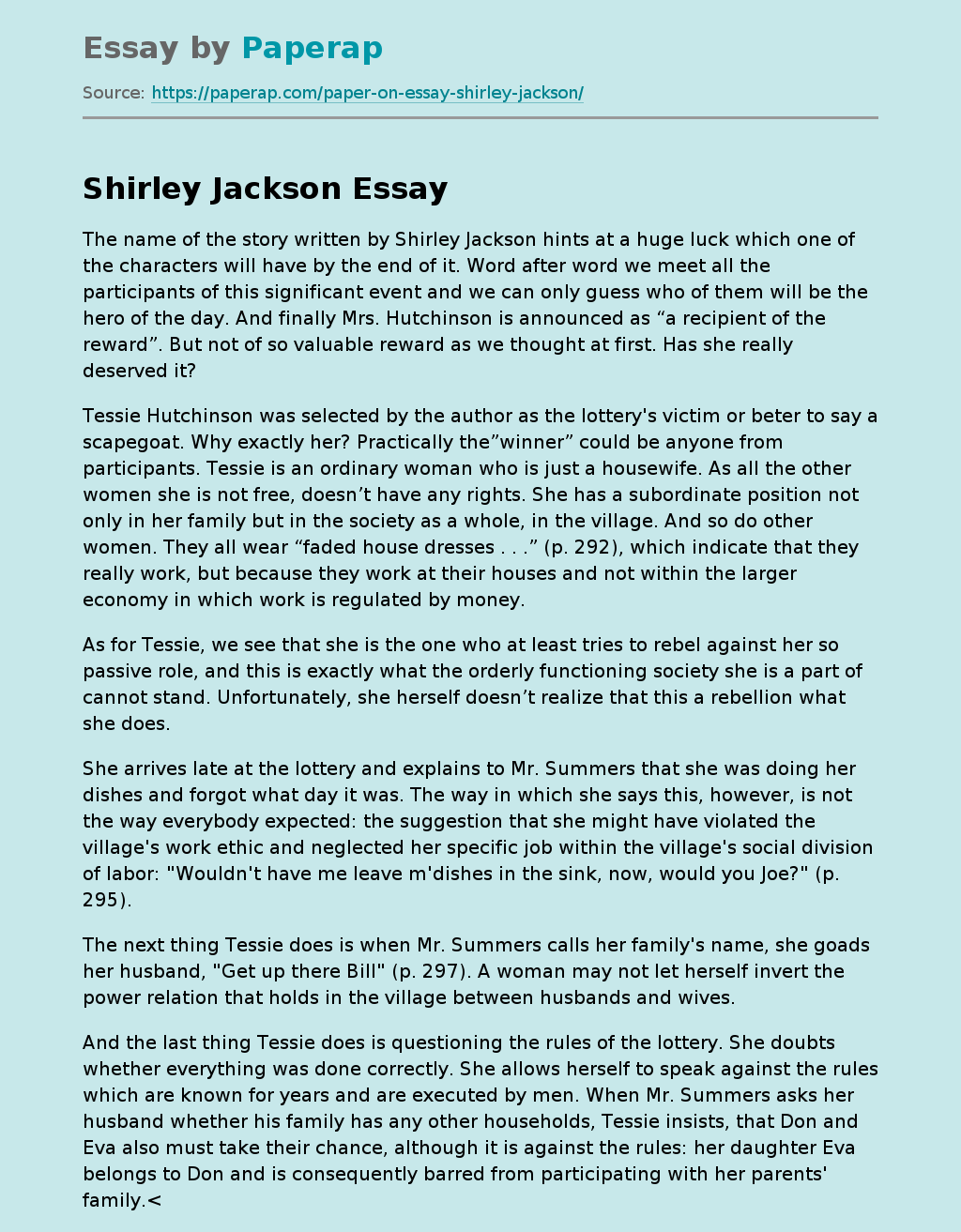"The Lottery" Shirley Jackson
The following sample essay on “The Lottery Shirley Jackson” introduces the characters in this story. The name of the story hints at a huge luck which one of the characters will have by the end of it. Has she really deserved it?
Tessie Hutchinson was selected by the author as the lottery’s victim or beter to say a scapegoat. Why exactly her? Practically the”winner” could be anyone from participants. Tessie is an ordinary woman who is just a housewife.
As all the other women she is not free, doesn’t have any rights. She has a subordinate position not only in her family but in the society as a whole, in the village. And so do other women. They all wear “faded house dresses . . .” (p. 292), which indicate that they really work, but because they work at their houses and not within the larger economy in which work is regulated by money.
As for Tessie, we see that she is the one who at least tries to rebel against her so passive role, and this is exactly what the orderly functioning society she is a part of cannot stand.
Unfortunately, she herself doesn’t realize that this a rebellion what she does.
She arrives late at the lottery and explains to Mr. Summers that she was doing her dishes and forgot what day it was. The way in which she says this, however, is not the way everybody expected: the suggestion that she might have violated the village’s work ethic and neglected her specific job within the village’s social division of labor: “Wouldn’t have me leave m’dishes in the sink, now, would you Joe?” (p.
295).
The next thing Tessie does is when Mr. Summers calls her family’s name, she goads her husband, “Get up there Bill” (p. 297). A woman may not let herself invert the power relation that holds in the village between husbands and wives.
And the last thing Tessie does is questioning the rules of the lottery. She doubts whether everything was done correctly. She allows herself to speak against the rules which are known for years and are executed by men. When Mr. Summers asks her husband whether his family has any other households, Tessie insists, that Don and Eva also must take their chance, although it is against the rules: her daughter Eva belongs to Don and is consequently barred from participating with her parents’ family.
All of her faults set Tessie up as the lottery’s likeliest victim. As she is being stoned she screams “It isn’t fair” (p. 302). But it is clear that she does not object to the lottery itself, but to her own selection as the “lucky winner”. It would surely have been fine with her if someone else had been selected.
I guess the average reader does disapprove Mrs. Hutchinson’s whining about the unfairness of the lottery. Had Mrs. Hutchinson shouted out at the beginning that the lottery was insane and shouldn’t be conducted, we might view her as a hero. Instead she participates until she realizes it will affect her family and begins to complain, not about the fact of the lottery but that it unfairly resulted in her family being chosen. The average reader has ingrained that once you opt into a process, you accept the consequences bravely.
The rest of the participants play their roles according to the rules of the lottery. Everybody accepts the fairness of the whole procedure and only Tessie cannot agree with the results. Unfortunately even after the lottery she as well as the others will remain blind, and the next time the lottery takes place somebody else will yell that the lottery is unfair.
"The Lottery" Shirley Jackson. (2019, Jun 20). Retrieved from https://paperap.com/paper-on-essay-shirley-jackson/

